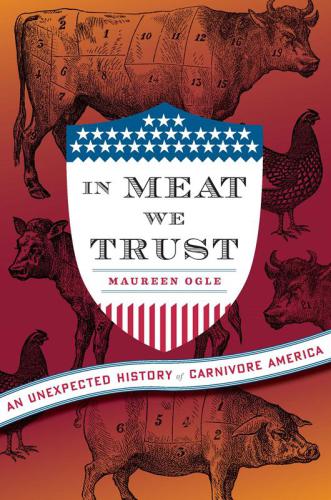
In Meat We Trust
An Unexpected History of Carnivore America
کتاب های مرتبط
- اطلاعات
- نقد و بررسی
- دیدگاه کاربران
نقد و بررسی

August 19, 2013
Ogle (Ambitious Brew: The Story of American Beer) lucidly demonstrates how the “American meat-making machine” came to span the entire continent, from the “grass-rich range of the Far West” to “slaughterhouses and wholesale markets at the other ,” with farmers squeezed throughout the middle. Ogle tracks the rise of factory farming, the introduction of subsidies for farmers, and the use of chemicals in animal husbandry, each in light of the consumer-advocacy backlash that spawned the organic and alt-agriculture movements. Ogle’s quick wit helps her corral such a large topic, keeping the involved history to an easily digestible format. Given the recent onslaught of publications picking sides on the issues of food production, Ogle’s bipartisan approach is a breath of fresh air. In fact, if Ogle has issue with anyone in the food chain, it is the American people and “our sense of entitlement and the way it contributes to the high cost of cheap living.” This type of straightforwardness might make the book hard to stomach for some, but it can’t be denied that Ogle has served up a lot of truth. Agent: Jay Mandel, William Morris Endeavor

October 1, 2013
Historian Ogle (Ambitious Brew: The Story of American Beer, 2006, etc.) explores the historical foundations and inaccuracies surrounding the story of the industry that supplies the beef, chicken and pork to America's carnivorous multitudes. The author does a solid job laying out the early steps involved in the building of America's meat industry: the early beginnings of farmers successfully farming cattle, corn and hogs in northeastern Virginia; the reign of the big meat packers; the contentious relationship between President Theodore Roosevelt and activist Upton Sinclair; the rise of chain grocery stores in the 1920s and the issues of packaging, distributing and producing a uniform product. Ogle chronicles the stories of the early pioneers in the meat business, including the "dressed beef men" such as Philip Armour, Gus Swift and others, who "designed slaughterhouses that emulated factories and incorporated those into complex, nationwide distribution systems," and Jesse Jewell, who in three decades, beginning in the mid-1930s, built an empire worth millions in the chicken business. Ogle's accessible recounting of the early days of the meat industry provides the solid framework for her wide-ranging exploration of the industry during the second half of the 20th century. She delves into the legislation, various reform movements and consolidation of the meatpacking industry in the 1960s and '70s. She also looks at the contemporary struggles of alternative meat producers and nonfactory farmers--e.g., Mel Coleman and his Natural Beef, and Bill Niman and Orville Schell, who began a cattle ranch in Northern California in the 1970s, supplying natural beef to local restaurants. An informative and entertaining narrative of the complexities of a massive industry, in which the author lays bare Americans' sense of entitlement and insistence on cheap and abundant meat and questions what that voracious appetite has wrought on our bodies and the environment.
COPYRIGHT(2013) Kirkus Reviews, ALL RIGHTS RESERVED.

November 15, 2013
Ogle (Ambitious Brew: The Story of American Beer) provides an unflinching look at the history of American meat industries: beef, pork, and poultry. She deftly details the peculiar struggles that led to an embrace of industrialization--changes that were seen as near miracles of science and production, designed to make food labor safer, more efficient, and better able to feed the nation. In particular, the combined forces of two world wars and the rise in the number of factories led thousands to seek their fortunes in cities, depriving farms of much needed workers. Factorylike farming solved the labor shortage, but farmers experienced the paradox of plenty: squeezed by too much supply, they were unable to sell at prices high enough to pay their own bills. Ogle generally keeps her opinions to a minimum and reserves her harshest criticism for the American public, whom she believes to be an entitled bunch that has spent the last century demanding that the paradox of plenty always be rigged in their favor. VERDICT In this work, which compares with Roger Horowitz's Putting Meat on the American Table: Taste, Technology, Transformation, Ogle expertly examines and illuminates the complex history of food, farming, politics, consumption, and the growth of a nation. Her fluid prose will appeal to skeptical readers who enjoy their history without an excess of preaching.--Rosemarie Lewis, Georgetown Cty. Lib., SC
Copyright 2013 Library Journal, LLC Used with permission.

October 1, 2013
Buy local! Eat organic! Grass-fed beef is best! These declarations are no longer the cries of sustainable farming activists on the fringe. Rather, the middle class has begun to champion a return to small-scale meat production, with cattle, pigs, and chickens that aren't hopped up on antibiotics or growth hormones happily roaming the family farm. The problem with this utopian dream, according to Ogle, is that mom-and-pop farms never actually dominated the landscape at any point in American history, since they could never meet the country's insatiable appetite for bountiful, low-cost meat. Instead, the agribusiness behemoths that have become villains in contemporary consciousness are actually examples of innovators and entrepreneurs who have kept our fickle nation fed. Ogle traces the stories of meat-industry movers and shakers, from colonial times to the present, and lambasts those she sees as reactionary, self-serving whistle-blowers, including Upton Sinclair and Ralph Nader. A well-researched history of the American meat industry that will appeal to readers looking for a counterpoint to Fast Food Nation (2001) and The Omnivore's Dilemma (2006).(Reprinted with permission of Booklist, copyright 2013, American Library Association.)

























دیدگاه کاربران